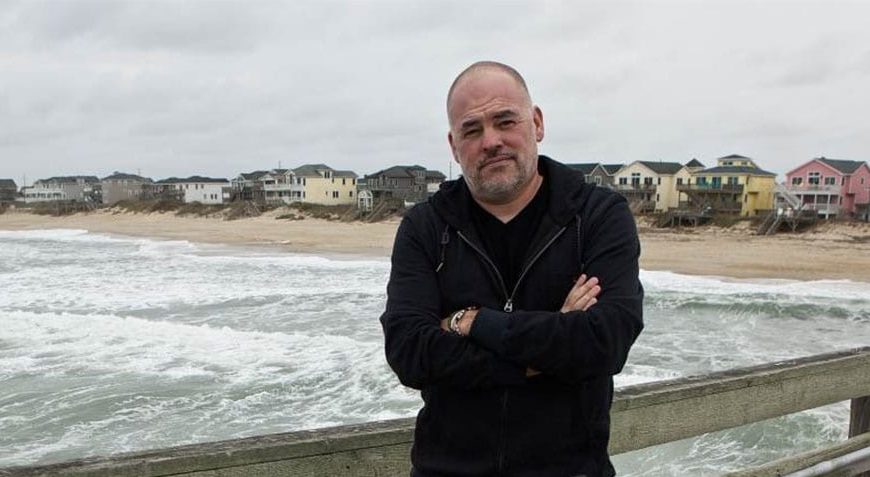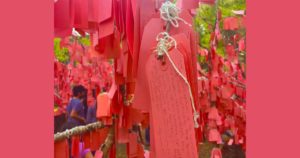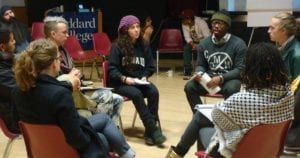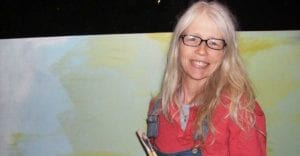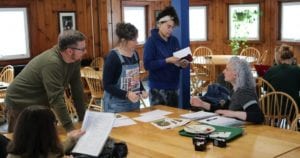Whenever you bump up against a writing situation that feels impossible, remember the Sugar Balloon, and all the experimentation, tenacity, innovation, determination, and risk that it took to arrive at this floating answer to a once-thought-impossible question.
 On Netflix, there is a documentary series called The Chef’s Table. Each episode traces the journey of a world renown chef. At first, I watched each episode passively—out of interest because I enjoy cooking. But then I began to notice a pattern that, as a creative writer, felt familiar to me. In each episode, the chef’s journey is similar to the next: a spark of passion leads to culinary school or an apprenticeship, which then leads to a low-paying job and eventually to executive chef in an upscale restaurant. I followed along as these chefs studied their craft. I followed their career paths—from line chef to sous to head to executive chef. And as the episodes increased in number, I noticed something important the chefs had in common: earning their place as executive chef was not the end of their journey, but the beginning. Sooner or later, they realized that becoming a Master of their Craft was not enough—it had to also be accompanied by work that was true to who they were as human beings—in other words, their work was not only about creating beautiful and tasty dishes for their diners, it had to also feed their souls.
On Netflix, there is a documentary series called The Chef’s Table. Each episode traces the journey of a world renown chef. At first, I watched each episode passively—out of interest because I enjoy cooking. But then I began to notice a pattern that, as a creative writer, felt familiar to me. In each episode, the chef’s journey is similar to the next: a spark of passion leads to culinary school or an apprenticeship, which then leads to a low-paying job and eventually to executive chef in an upscale restaurant. I followed along as these chefs studied their craft. I followed their career paths—from line chef to sous to head to executive chef. And as the episodes increased in number, I noticed something important the chefs had in common: earning their place as executive chef was not the end of their journey, but the beginning. Sooner or later, they realized that becoming a Master of their Craft was not enough—it had to also be accompanied by work that was true to who they were as human beings—in other words, their work was not only about creating beautiful and tasty dishes for their diners, it had to also feed their souls.
In response to this realization, they began new culinary journeys—journeys that traveled in two simultaneous directions—forwards and backwards. These new journeys were a search for what it was that had nourished them in the first place; the thing that had ignited the initial spark of their passion for cooking. One chef found it in an obvious place—in the fire that had been the primary source of cooking in his grandmother’s kitchen; another chef found it in the less obvious smell of the soil of his childhood; another chef found it in a particular kind of almond that only grows in his homeland, and so on. There are 26 episodes of The Chef’s Table, and yes, there are some variations to this trajectory, notably Jeong Kwan—a Buddhist nun and chef of Korean cuisine who only cooks for fellow nuns and monks, and who has no formal culinary training—but what doesn’t vary is that they each chef transformed into an artist par excellence by defining for themselves their relationship to their work.
One chef in particular had a spectacular transformation. His name is Grant Achatz. By the age of 28, Achatz had already reached a pinnacle of excellence by winning the Rising Star Chef of the Year Award. Six months later, he noticed a white spot on his tongue. Which he ignored. Until he couldn’t eat. Or drink. And until he could barely talk. He went to a doctor who diagnosed him with stage IV cancer. The initial recipe for this treatment was to remove 3/4 of his tongue, his left mandible, and both sides of his neck. He was given a 70% chance of survival. He decided he would rather die than live without the part of him that was the core of his identity. An announcement about his cancer was made in the newspapers, which prompted another doctor to come forward. This doctor offered him an experimental treatment—no surgery and a 70% chance of success. But it wasn’t the sudden more promising diagnosis that changed Achatz’s mind to fight for his life, it was that this alternative approach was experimental—it pulled apart the standard model and it put it back together differently. Why did this have a positive effect on Achatz? Because this approach was exactly what he had been doing with his cooking. Needing a large canvas for his culinary creations, and refusing to be limited by plate manufacturers, Achatz made the entire table into a plate. He was also experimenting with food—he’d already found a way to make mousse—ordinarily something smooth and creamy—crispy! He was also asking himself questions like: Could he make food invisible? Could he make food float? His creativity made him want to try to do the impossible with food. And this alternative cure for stage IV cancer seemed like the same thing—trying to do the impossible. Which made him have faith in this process.
After twelve weeks of twice-daily chemo he was cancer-free.
But.
He had lost his taste buds.
He was alive, but with a new impossible question to try to answer: How could he be chef when he was unable to taste anything?
He determination to succeed at all costs kicked in. Instead of focusing on taste, he focused on innovation. This new approach taught him the most important lesson of his culinary life: that taste is in the brain, not on the tongue.
It took losing his sense of taste, and learning this important lesson, to teach him how to be a chef who is true to himself. In the past, he had cooked perfect food. He had presented it like a visual artist—on a table that looked more like a painter’s canvas. But after losing his sense of taste, his relationship to his own artistic medium transformed into something more deeply connected to who he was as an individual.
So why am I talking to soon-to-be-Master writers about Master chefs? I’m talking to you about the similarity of the journey. It is no accident that the end of your academic journey is called a commencement—a beginning, a kick-off, a launch. Whatever way you think of it, this two-year trip will be yours to define. And so is your future.
At the end of this ceremony, your degree will be conferred upon you. And as a result of all the work you’ve completed, you will have earned the title Master of Fine Arts. You have studied your craft. You have revised and polished your words. This is your version of a perfectly cooked and artfully presented meal. You will go out into the world and submit your work for publication. Sometimes it will be accepted. Sometimes it will be sent back to the kitchen. You will write new things. In a few years, you might even get some national acclaim and win the literary equivalent of the Rising Star Chef of the Year Award. And your bio will grow into a list of accomplishments.
But for all writers there comes a time when life throws you a curve ball—it could be something extreme, but more often than not it is something benign—work demands, family demands, etc. When this happens, I’d like to tell you what I wish someone had told me when I graduated: When the curve ball comes your way, your determination must kick into high gear, and you must have a writing survival strategy in place.
At Goddard, we’re all about community. So before you leave today, here’s what I recommend as this strategy: make a commitment to become each other’s writing partners. Form an ironic post-MFA council. Call it something tongue-in-cheek like The Goddard Council of Writers Who Ask Impossible Questions. Give yourself a charter. Something like: Members of this council will commit to do the following: exchange ideas, exchange work, exchange feedback, exchange information, exchange lows, exchange highs. Obviously, the key word here is “exchange.” Because what I have learned over my thirty-year-writing-life is that despite the fact that our discipline is a solitary endeavor, it also needs a council of writer-friends to keep it going.
For Grant Achatz, his sense of taste slowly returned, after a few weeks he could taste sugar. A few weeks after that, he could taste salt. When his sense of taste fully returned, he felt as if he’d been given a second chance, and he ran with it. He learned to be risky. He learned to be collaborative. Eventually, he returned to his earlier “impossible” question: How can I make food that floats? This time, though, he formed his own kitchen council and changed the “I” in his question to a “we”—How can we make food that floats? An executive chef working with him—Mike Bagale—ran with the Achatz’s question. After much collaboration and experimentation, they found the recipe, which turned the impossible into the possible—a sugar balloon!
So this is where I’m landing at the end of what I’d like to say to you today: Whenever you bump up against a writing situation that feels impossible, remember the Sugar Balloon, and all the experimentation, tenacity, innovation, determination, and risk that it took to arrive at this floating answer to a once-thought-impossible question.
Graduates: As you ready yourselves to embark on this new beginning—this kick-off, this launch into the rest of your writing lives—you too will need similar qualities. Be risky. Be tenacious. Be innovative. Be collaborative. Pose the impossible questions to your fellow Goddard Council members. Experiment together. Work together. Continue this journey of discovery. Help each other to inflate your own sugar balloons.

~ * ~

